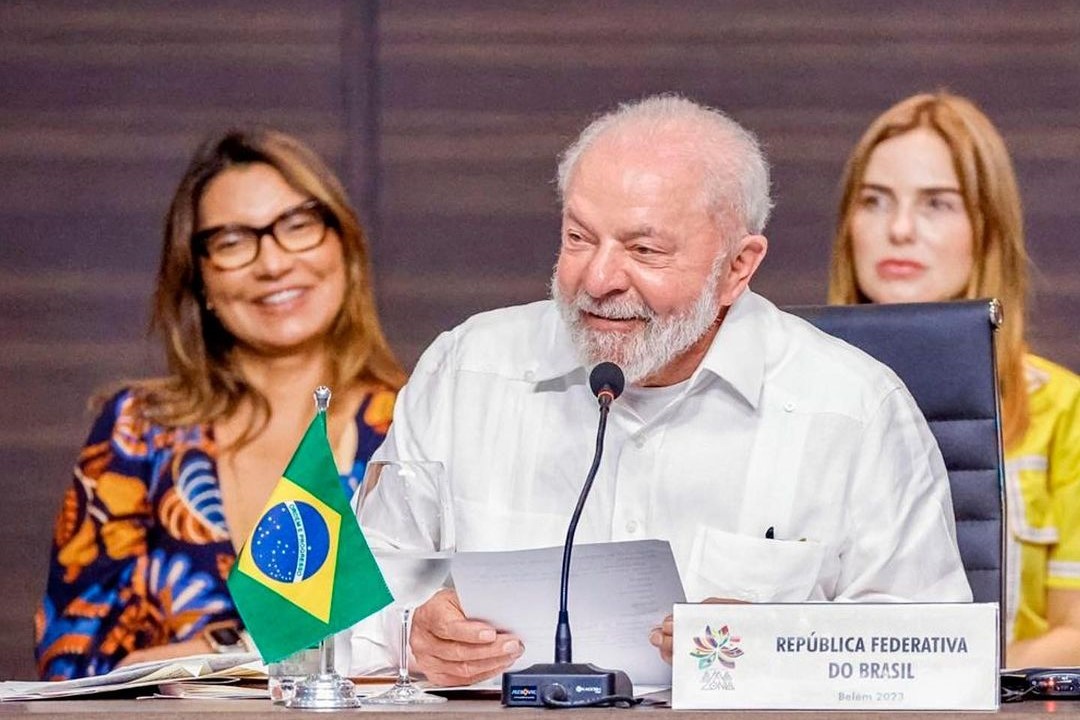

Brazilian President Luiz Inácio Lula da Silva described the two-day summit, held August 8-9, as the beginning of “a new Amazonian dream.”
“I hope that each person, each city, each river, and each tree in our vast rainforest finds its place in this vision of a new Amazon,” he said.
With a geographical area that is one and a half times the size of the European Union, he said, the South American Amazon is the largest tropical rainforest in the world and contains 10% of all known plants and animals.
“But the Amazon isn’t just made up of flora and fauna,” he added, noting that 50 million people live across the territory, whether in large metropolitan areas or remote villages. The Amazon is home to 400 indigenous peoples who speak more than 300 languages, Lula said.

Indigenous representatives participating in the Amazon Dialogues called for official titling of their lands in their ancestral territories. Credit: Brazilian Government.
“To understand this place, we need to listen to those who already know it well,” the Brazilian president said. He stressed the need to recognize deep structural problems—including hunger and a lack of drinking water in many parts of a region rich in biodiversity and water resources. With the growth of transnational criminal activity, insecurity is another problem, he said, adding that Brazil plans to establish an International Police Cooperation Center in Manaus to address crime in the region.
The Amazon will be whatever we want it to be.
An Amazon with greener cities, purer air, rivers without mercury, and a standing rainforest.
An Amazon with food on the table, decent work, and public services available to all.
An Amazon with healthier children, welcomed migrants, respected indigenous people, and more hopeful young people.
An Amazon that awakens and becomes aware of itself.
This is our Amazonian dream. From remarks by Brazilian President Luiz Inácio Lula da Silva at the Amazon Summit
Lula, who took office at the beginning of the year for a third term (he previously served two consecutive terms, beginning in 2003), criticized his predecessor for an increase in deforestation rates and stressed his own commitment to turn the situation around.
“We can already see the results,” he said. “Deforestation alerts in the Amazon have dropped 42.5% in the first seven months of this year. We are committed to zero deforestation by 2030.”
In addition to Lula, the summit included the participation of President Luis Arce of Bolivia, President Gustavo Petro of Colombia, President Dina Boluarte of Peru, and Prime Minister Mark Phillips of Guyana. Venezuelan Vice President Delcy Rodríguez represented her country, while Ecuador was represented by Foreign Minister Gustavo Manrique and Suriname by Foreign Minister Albert Ramdin. (France’s Ambassador to Brazil, Brigitte Collet, also attended, in representation of French Guiana, an overseas department of France.)
The eight South American countries belong to the Amazon Cooperation Treaty Organization (ACTO), which is based in the Brazilian capital of Brasilia. The intergovernmental organization was established 20 years ago to implement the objectives of the 1978 Amazon Cooperation Treaty. This was the fourth meeting of ACTO presidents and the first in 14 years.

The Brazilian President said his policies were already showing results, including a more than 42% drop in deforestation alerts in the first seven months of 2023. Credit: Ricardo Stuckert
In his remarks at the summit, Lula said that the Amazon Cooperation Treaty would be the main platform the countries would use to face challenges together, and stressed the need to provide ACTO with resources and a broader action program. The presidential declaration issued at the summit includes an extensive section on the institutional strengthening of ACTO.
The 113-point declaration covers a broad range of topics, calling for increased cooperation on water resources management, protection of forests and biodiversity, climate action, sustainable economic development, health, food security, and the fight against illicit activities, including illegal mining, illegal logging, and drug trafficking. The declaration states that the parties’ new common agenda will observe five crosscutting principles:
The section on climate change stresses that developed countries must meet their commitments related to climate finance, including the target of mobilizing $100 billion per year to support the needs of developing countries. It also calls for advancing “innovative mechanisms for financing climate action, which could include debt-for-climate action swaps by developed countries.”
During the second day of the summit, the ACTO representatives were joined by leaders from several other countries with tropical rainforests—including Indonesia, Republic of Congo, Democratic Republic of Congo, and Saint Vicent and the Grenadines—as well as partner countries and organizations.
They signed a separate joint communiqué, along with the ACTO countries, called “United for Our Forests.” It reaffirms their “commitment to forest preservation, reducing the drivers of deforestation and forest degradation, conserving and valuing biodiversity, and pursuing a just ecological transition.”
 View Map
View Map